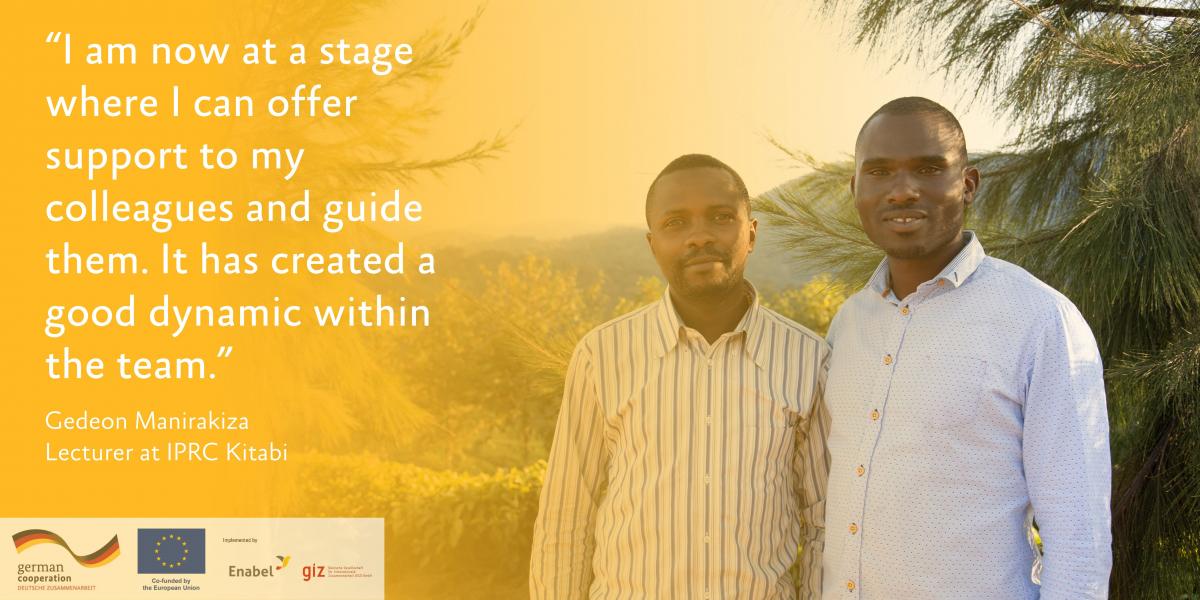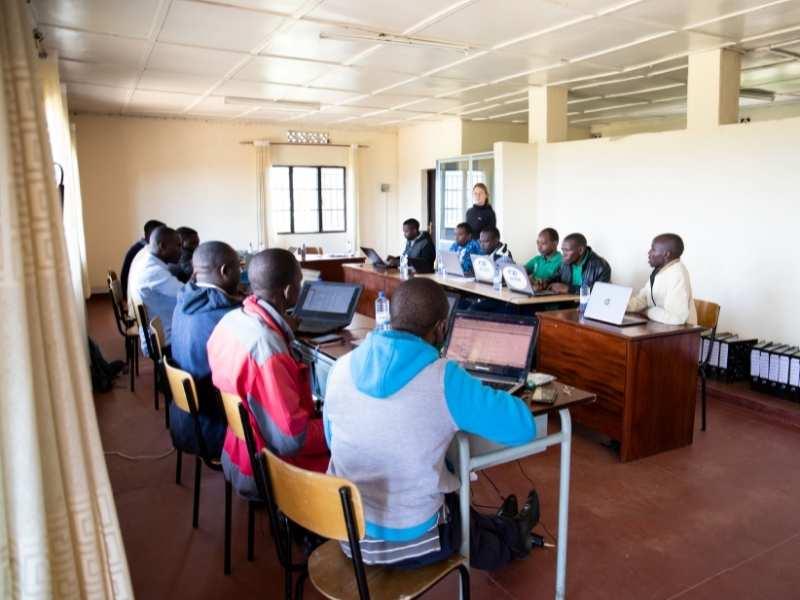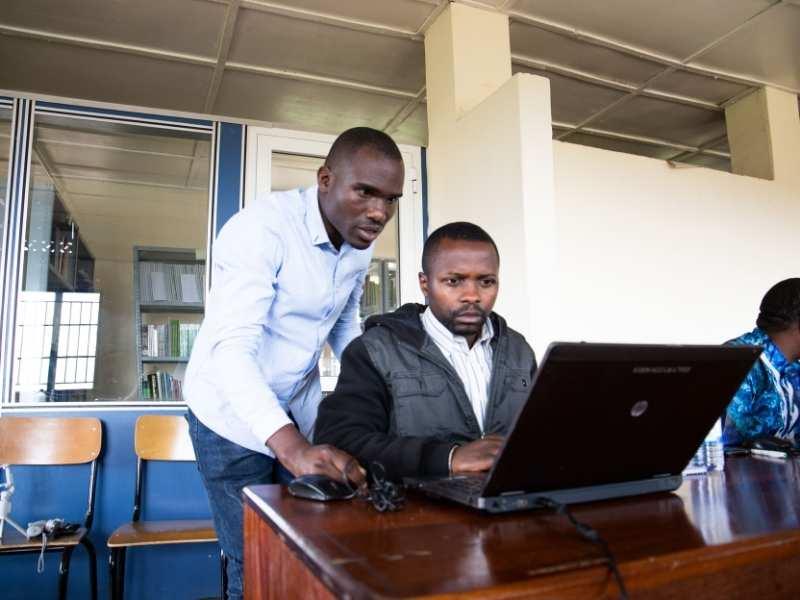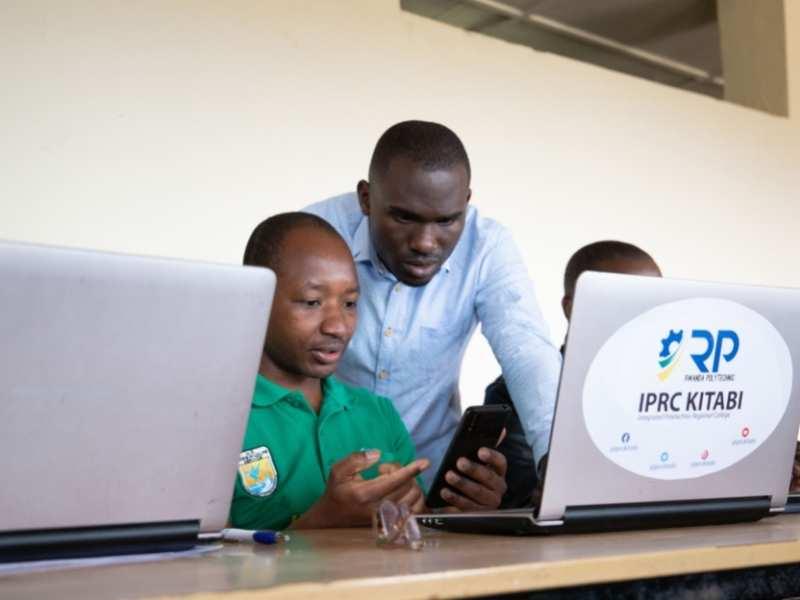Train the trainers: 4 questions to Gedeon Manirakiza and Fulgence Hagumubuzima, lecturers at IPRC Kitabi (Rwanda)
Gedeon Manirakiza and Fulgence Hagumubuzima are lecturers at IPRC Kitabi and have both been following trainings to not only being able to navigate in the new e-learning platform implemented in their school but also to create their own content and guide their colleagues. While Gedeon started some months ago, Fulgence, his colleague just joined the training.
How do they collaborate? What do they see as benefits in digitalisation for education?
Thanks to their answers, take a closer look into those activities, led by the Resilience to COVID-19 through digitalisation (RESICODI) project, at IPRC Kitabi.
Can you shortly present yourself?
Gedeon Manirakiza: I am assistant lecturer in forestry department, especially in forestry resources management, at IPRC Kitabi.
Fulgence Hagumubuzima: I am a researcher in forestry department, I actually teach various courses including agroforestry, forest plantation for different levels. I joined the school in 2015 as a student and I am now currently working as lecturer.
When did you start the trainings? What was your opinion at the beginning?
G.M.: A few months ago, Enabel team came to offer us a specific training process on Digital Content Development. It came actually with the aim of supporting us to teach online due to the various circumstances we had to face with the COVID-19 pandemic. It arrived at that a time when it was difficult to stay in touch with our students and we did not really know how to not stop the learning process. I am really thankful for that initiative even if I have to admit that I was not sure digitalisation could help us in this scenario as a lot of students do not have access to a good internet connection.
F.H.: I’ve joined the training on digital content development a bit later than my colleague Gedeon. Actually, I heard from him and other colleagues who had been following the training that the online platform was really helpful to stay in touch with students and create more interactions with them. My expectations are therefore quite high because I really want to learn about the value and impact that digitalisation can have on my courses and students.
How does digitalisation change your teaching approach? Do you see any benefits or challenges?
G.M.: On the one hand thanks to this new approach, I have realised how digital content can make my courses more interactive. It allows us to give (remotely) some tasks to students and they can take some time to make research and produce qualitative work. At the same time it has reduced the distance between me and my class, the interactions between trainer and trainees are more pleasant.
On the other hand, I am now at a stage where I can offer support to my colleagues and guide them into the process of using the platform and developing their own content.
F.H.: At this point, as I have only been following some days of trainings I cannot say precisely what it is going to change but I have my opinion about it. I suppose, from what I have seen, that this platform and online content will allow me to guarantee a continuity in teaching. During the COVID-19 pandemic, as everybody had to stay home it was not a great period for teaching, interactions were almost impossible and it was really frustrating. I am sure it will allow students to learn quickly and be more reactive when it comes to using digital tools. Then I think that I will see a great opportunity to optimise time management for students and teachers by improving the quality of the content and make sure at each step that students are still following and understanding the course.
What are your expectations for the future?
G.M.: At this point I am glad that I can create my own digital courses and upload it on the platform. I also know how to add quizzes and various assignments for my students. Nevertheless it will be far more important in the future to be able to monitor the attendance and evolution of my classes.
F.H.: I do expert to become an expert in the platform. I have to stay that I am really confident and glad that the program has focused at first on some colleagues as Gedeon. They are now experts and can quickly give support and answer to our questions. I am very motivated to soon be able to develop the same skills as them and then be able to help my colleagues if they are stuck with the platform. I am setting some personal objective to master the platform and hope I will be soon able to present my own courses online.
Dernières actualité de ce projet
Pas d'actualité




